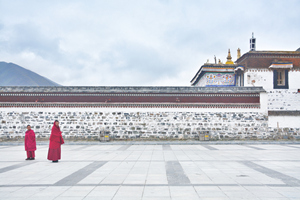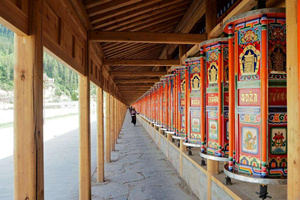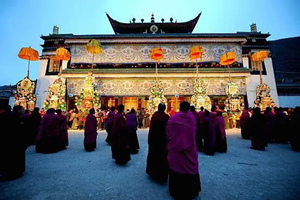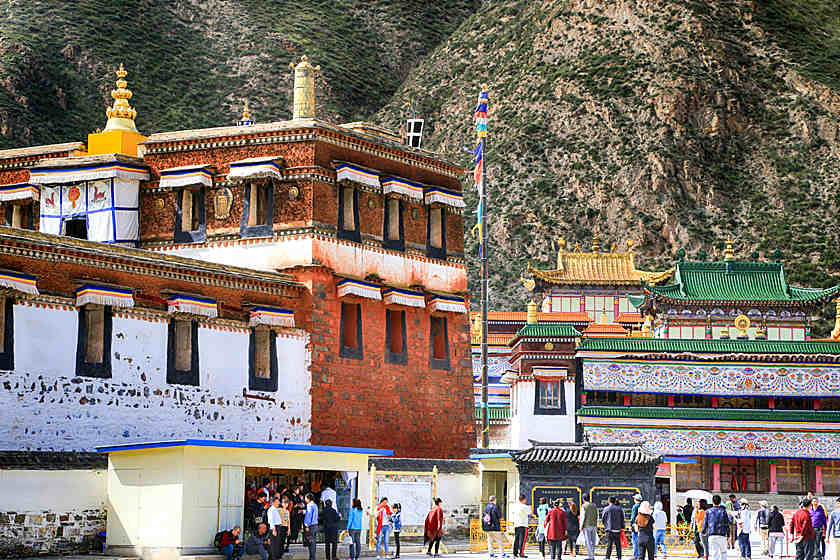Chinese Name: 拉卜楞寺 Pronunciation: lā bǔ léng sì
Suggested Visiting Hours: 2 Hours
Temple Area: About 866,000 square meters
Building Time: 1709
Building Function: Disseminating Buddhism, worshiping Buddha
Best Visiting Time: All year round
Address: No. 252, West Renmin Street, Labrang Town, Xiahe County, Gannan Tibetan Autonomous Prefecture, Gansu Province
|
Main halls
|
Gongtang Pagoda
|
Exterior Areas
|
|
| 40 yuan | 20 yuan | Free | |
|
Grand Sutra Hall and Gongtang Pagoda
|
Other halls
|
|
| 08:00-18:00 | 08:00-16:00 | |

Labrang Monastery covers a total area of 866,000 square meters and building area is more than 400,000 square meters including the main temples and six big institutes. Labrang Monastery has become not only a comprehensive university for the dissemination of Buddhist knowledge but also a cultural and art center of Tibetan nationality.
Buddhist Labrang Monastery is one of the Tibetan’s six monasteries. It has a strong Tibetan architectural feature and greater influence in Gansu and Qinghai regions. It has a major impact on Chinese Confucius culture and Tibetan Buddhism.
Labrang Monastery opened to the public in 1980. In 1982, it was designated by the State Council of China as a national key cultural relics protection unit.
Labrang Monastery was founded in the 48th year of Emperor Kangxi in the Qing Dynasty (1709). In the 53rd year of the Reign of Emperor Kangxi (1714), the "La Zhang" (Jamyang Buddha Palace) was established. The name of "La Zhang" changed to “Labrang”, which means the highest Living Buddha palace in the whole temple.

It is the longest winding corridor in the world, which stretches for nearly 3.5 kilometers around the temple. Inside the corridor, there are many huge turning wheels, which are about 1.5 meters high. The bright and beautiful wheels are painted with patterns and printed scriptures.
The precious ethnic cultural relics and Buddhist art collections in the Labrang Monastery are more than 10,000 pieces in total. In each Buddha Temple, there are small and medium-sized Buddhas, Bodhisattvas, Dharma wares and so on. The temple also treasures the clothes and other articles of daily use of the ancient masters.

The six colleges are Wen Si College, Shi Lun College, Medical College, Xi Jingang College, Xubu College Shang and Xubu Xia College.
Wen Si College is the biggest hall, which is the center of the whole temple. All the meetings and receptions are held in Wen Si College.
Shi Lun College was built in 1763, which had a strong style of Tibetan construction.
Medical College has ten rooms where visitors will know more about the masters of medicine.
In 1879, Xi Jingang College was built. It has a similar construction style with the Potala Palace.
Xubu Shang College is on the west side of Xi Jingang College, which was built in 1941. The main hall consists of 10 rooms from south to north and 5 rooms from east to west. The top floor was a palace-like style and covered with green glazed tiles.
Xubu Xia College was built in 1716. It is a Tibetan-style building with a complete set of Falun(a Buddhist artifact) and flags on the top of the temple.
There are five buses from Lanzhou South Coach Station to Xiahe County at 7:30, 8:30, 9:30, 14:00 and 15:00 every day. The journey takes about 5 hours and the ticket price is 75 yuan.
Chinese: 请带我去拉卜楞寺。English: Please take me to the Labrang Monastery.
If you go to the Labrang Monastery from the center of Lanzhou, it takes about 3hours (300yuan).
If you go to the Labrang Monastery from the Lanzhou Zhongchuan International airport, it takes about 4hours (400 yuan).
If you go to the Labrang Monastery from the Lanzhou West Train Station, it takes about 3hours (318yuan).
